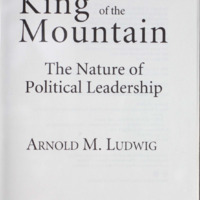-
Title
-
King of the mountain : the nature of political leadership
-
Description
-
Political leaders govern countries, negotiate treaties, control military forces, and shape economies. Advanced as these activities may seem, however, psychiatrist Arnold M. Ludwig contends that rulers' actions are rooted in the alpha-male behaviors of monkeys and apes.."Profiling every ruler of a recognized country in the twentieth century - over 1,900 people in all - Ludwig establishes how rulers came to power, how they lost power, the dangers they faced, and the odds of their being assassinated, committing suicide, or dying a natural death. Concentrating on a smaller set of rulers for whom more extensive personal information was available, Ludwig profiles the six different kinds of leaders, examining their characteristics, childhoods, and mental stability or instability to pinpoint chief predictors of later political success."--BOOK JACKET.
-
Identifier
-
1013446
-
813122333
-
Creator
-
Ludwig, Arnold M
-
Source
-
Brian Lamb Booknotes Collection
-
Gift of Brian Lamb, 2011.
-
Catalog record
-
Language
-
eng
-
Date
-
2002
-
Program air date: September 15, 2002
-
Publisher
-
University Press of Kentucky
-
George Mason University. Libraries. Special Collections & Archives
-
Text
-
Transcription of Annotations
Front endpapers contain notes on the characteristics of Alpha males, the Great Man Theory, the Seven Pillars of Greatness, which are defined as Dominance, Contrariness, Personal presence, Change agent, Vanity, Courage, Wary unease. Other notes provide statistical information, e.g. of 1941 20th century rulers, 22 were women; of 3241 years of recorded history, only 268 have been free of war; in the 20th century 35 combatants were the cause of 200 million deaths. Several rulers are listed as visionaries: Sukarno, Ataturk, Castro, and the infamous five - Hitler, Mao, Mussolini, Stalin, Pol Pot. Others listed are Kim Il Sung and Ceausescu; Emperor Franz Joseph of Austria, who reigned for 68 years, is referred to as the "gold plated standard for monarchs". -- Back endpapers contain a list of 6 different types of leaders - Monarchs, Tyrants, Visionaries, Authoritarians, Transitionals, Democrats - and this list of 20th century leaders: Lenin, Stalin, Tito, Churchill, Ataturk, de Gaulle, FDR, Chamberlain, Hoover, Harding, Hitler. -- Annotations by Brian Lamb in the margins and underlining of pertinent phrases throughout the book. -- Example: p. 185: "Mostly tyrants were deeply religious people, or pretended to be so, and saw no contradictions between their avowed beliefs and their deeds." -- p. 361: "Loving your neighbor as you love yourself may be "the Christian way", but it is not the way of primates and, therefore, not the way of the world." -- p. 363: "Despite numerous reasons given for their wars, rulers who engaged in military pursuits or killed their own countrymen to enforce their social agendas remained in office far longer than those who did not."
-
Subject
-
"Political leadership."
-
"Political leadership--Psychological aspects."
-
"Politicians--Psychology."
-
Relation
-
Original Booknotes interview
-
Rights
-
This work may be protected by copyright laws and is provided for educational and research purposes only. Any infringing use may be subject to disciplinary action and/or civil or criminal liability as provided by law. If you believe that you are the rights-holder and object to Mason’s use of this image, please contact speccoll@gmu.edu.
 1013446.pdf
1013446.pdf